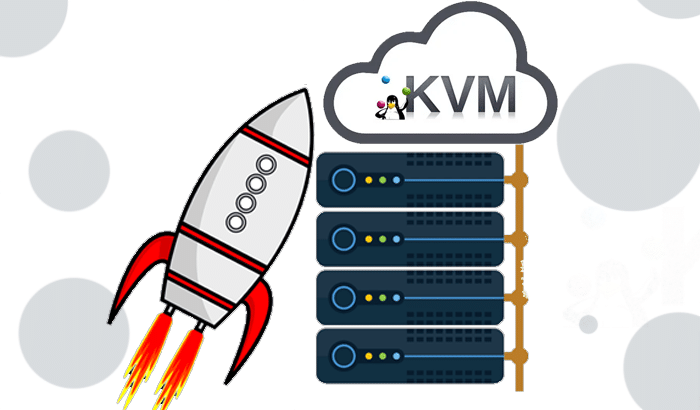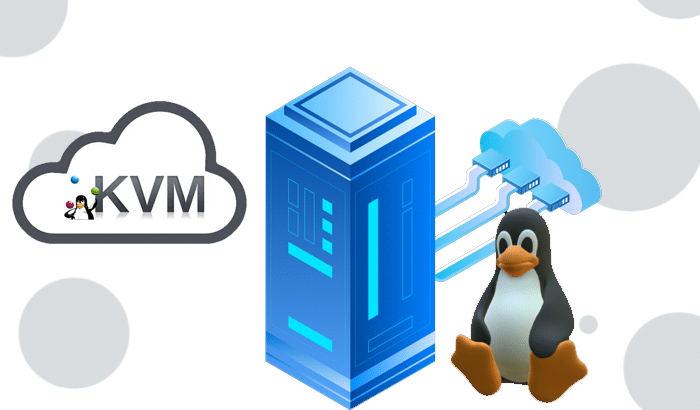In today’s digital landscape, virtualization technology has revolutionized the way we approach server management and hosting solutions. One such technology that has gained significant popularity is KVM VPS.
But what exactly is KVM VPS? In this article, we will delve into its definition, explore its benefits, and discuss its drawbacks. So, let’s dive in and uncover the world of KVM VPS.
Daftar Isi :
What is KVM VPS?
In the rapidly evolving world of web hosting, Virtual Private Servers (VPS) have emerged as a game-changer, offering businesses and individuals a flexible and cost-effective solution for their hosting needs. Among the various types of VPS available, KVM (Kernel-based Virtual Machine) VPS stands out as a powerful and versatile option. Let’s delve into the fascinating world of KVM VPS and understand how it unlocks the potential of virtualization.
At its core, KVM is a virtualization technology that allows the creation and management of virtual machines (VMs) on a physical server. Unlike other VPS technologies, KVM operates directly on the host’s kernel, offering exceptional performance and security. KVM VPS enables users to run multiple isolated virtual environments on a single physical server, with each VM functioning as an independent server with its dedicated resources.
One of the key advantages
One of the key advantages of KVM VPS is its ability to provide a near-dedicated hosting experience. Each virtual machine is allocated dedicated resources such as CPU cores, RAM, disk space, and network bandwidth. This ensures that the performance of one VM is not affected by the activities of other VMs on the same server. With KVM VPS, users can enjoy the benefits of dedicated resources at a fraction of the cost.
Additionally, KVM VPS offers excellent compatibility and versatility. It supports a wide range of operating systems, including various flavors of Linux and Windows, allowing users to choose the OS that best suits their requirements. This flexibility makes KVM VPS an ideal choice for hosting diverse applications and running different software stacks simultaneously.
Another notable feature of KVM VPS is its robust security. As each virtual machine runs in isolation, any vulnerabilities or issues within one VM do not impact the others. This ensures enhanced security and protects critical data and applications. KVM VPS also allows for easy scalability, enabling users to adjust resource allocation based on their evolving needs without any downtime.
When it comes to managing KVM VPS, users have complete control and autonomy. They can customize their virtual environment, install desired software, and manage the server as if it were a dedicated machine. Furthermore, KVM VPS offers seamless migration options, allowing users to transfer their virtual machines between different KVM hosts effortlessly.
Benefits of KVM VPS
1. Enhanced Performance and Stability
KVM VPS provides a high level of performance and stability due to its ability to allocate dedicated resources to each virtual server. Unlike shared hosting, where resources are shared among multiple users, KVM VPS ensures that you have your own dedicated resources, including CPU, RAM, and disk space. This ensures consistent performance and eliminates the risk of other users impacting your server’s stability.
2. Full Root Access
One of the major advantages of KVM VPS is the provision of full root access. This means that you have complete control over your virtual server, allowing you to install custom software, modify system configurations, and manage security settings according to your specific requirements. Having full root access provides a level of flexibility that is essential for businesses with unique hosting needs.
3. Isolation and Security
KVM VPS offers a high level of isolation, ensuring that the actions of other virtual servers do not impact the performance or security of your own server. Each virtual server operates independently with its own set of resources and processes, creating a secure and private environment. This isolation enhances the security of your data and applications, making KVM VPS an ideal choice for businesses that prioritize data protection.
4. Scalability
With KVM VPS, scalability is never an issue. As your business grows and demands increase, you can easily upgrade your virtual server’s resources without any downtime. Whether you need additional CPU power, RAM, or storage space, KVM VPS allows for seamless scalability, ensuring that your server can accommodate your evolving needs.
5. Operating System Flexibility
KVM VPS supports a wide range of operating systems, including various Linux distributions and even Windows. This flexibility allows you to choose the operating system that best suits your specific requirements and preferences. Whether you need a Linux-based environment for web hosting or a Windows environment for running specific applications, KVM VPS provides the flexibility to cater to your needs.
Drawbacks of KVM VPS
1. Resource Intensive
While KVM VPS offers dedicated resources to each virtual server, it also requires substantial resources from the underlying physical server. This means that the host server needs to have sufficient CPU power, RAM, and disk space to accommodate the virtual servers. In some cases, resource-intensive applications running on multiple virtual servers may put a strain on the host server, potentially affecting overall performance.
2. Higher Cost
Compared to shared hosting, KVM VPS tends to be more expensive. This is primarily due to the allocation of dedicated resources and the enhanced level of control and security it offers. If you are running a small website or have minimal hosting requirements, shared hosting may be a more cost-effective option. However, for businesses that require advanced features and resources, the benefits of KVM VPS often outweigh the higher cost.
3. Technical Expertise Required
Managing a KVM VPS requires a certain level of technical expertise. With full root access comes the responsibility of server management, security configurations, software updates, and troubleshooting. While many hosting providers offer managed services for KVM VPS, having a solid understanding of server administration is beneficial to fully utilize the capabilities of KVM VPS.
5 Best KVM VPS Hosting Provider In 2023
1. Bluehost
Bluehost is a reputable web hosting provider that offers reliable KVM VPS hosting solutions. With their KVM-based virtualization, users can experience enhanced performance, security, and scalability. Bluehost provides a user-friendly interface, robust server resources, and excellent customer support, making it an ideal choice for businesses and individuals looking for reliable KVM VPS hosting.
2. HostGator
HostGator is known for its feature-rich hosting plans, including KVM VPS hosting. Their KVM-based virtualization ensures optimal server performance, isolated resources, and improved security. HostGator offers flexible plans, efficient server management tools, and 24/7 customer support, making it a top choice for those seeking reliable and scalable KVM VPS hosting solutions.
3. A2 Hosting
A2 Hosting is renowned for its high-performance hosting solutions, and their KVM VPS hosting is no exception. With A2 Hosting, users can expect lightning-fast page load speeds, robust security measures, and reliable uptime. Their KVM VPS plans come with root access, SSD storage, and customizable resources, providing the flexibility needed to meet varying hosting requirements.
4. SiteGround
SiteGround is a trusted hosting provider that offers KVM VPS hosting with a focus on performance and security. Their KVM-based virtualization ensures resource isolation and enhanced server stability. SiteGround provides advanced server monitoring, automated backups, and a user-friendly interface. Their top-notch customer support adds value to their hosting services.
5. DreamHost
DreamHost is known for its reliable and affordable hosting solutions, including KVM VPS hosting. With their KVM-based virtualization, users can expect dedicated resources, high performance, and seamless scalability. DreamHost offers SSD storage, easy-to-use control panel, and 24/7 customer support, making it a solid choice for individuals and businesses in need of reliable KVM VPS hosting.
Each of these hosting providers offers reliable KVM VPS hosting solutions with varying features and pricing plans. It’s essential to consider your specific requirements, such as resource needs, budget, and customer support, when selecting the best KVM VPS hosting provider for your needs.
Choosing The Best KVM VPS Hosting Provider In 2023
Choosing the best KVM VPS hosting provider in 2023 requires careful consideration of several factors. Here are some key points to keep in mind when making your decision:
1. Performance and Reliability
Look for a hosting provider that offers robust hardware infrastructure, including high-quality servers and solid-state drives (SSDs) for faster performance. Check for guaranteed uptime, as well as the availability of scalable resources to accommodate your website’s growth.
2. Server Locations
Consider the geographic locations of the hosting provider’s data centers. Choosing a data center that is geographically closer to your target audience can help reduce latency and improve website loading speeds for your visitors.
3. Scalability and Resource Allocation
Evaluate the scalability options provided by the hosting provider. Ensure that they offer flexible plans that allow you to easily upgrade or downgrade your resources (such as CPU cores, RAM, and storage) as your website’s needs change over time.
4. Management and Control
Determine the level of management and control you require. Some hosting providers offer fully managed services where they handle server maintenance, security updates, and backups, while others offer more control and customization options for advanced users who prefer managing their own virtual servers.
5. Security Measures
Look for hosting providers that prioritize security. They should offer features like firewalls, DDoS protection, regular backups, and proactive monitoring to ensure the safety and integrity of your data.
6. Customer Support
Consider the quality and availability of customer support. Look for hosting providers that offer 24/7 customer support through multiple channels (such as live chat, phone, or ticketing system) to assist you promptly in case of any technical issues or queries.
7. Pricing and Value
Compare pricing plans and ensure they align with your budget and requirements. While cost is a factor, it’s crucial to balance it with the quality of service provided by the hosting provider. Look for transparent pricing structures without hidden fees and consider the value-added features included in the plans.
8. Reputation and Reviews
Research the reputation of the hosting provider by reading reviews and testimonials from other users. Consider their experience, track record, and customer satisfaction levels to gauge their reliability and performance.
By carefully evaluating these factors, you can choose the best KVM VPS hosting provider that aligns with your specific needs, ensuring a reliable and efficient hosting environment for your website or application.
Frequently Asked Questions (FAQs)
Q1: What is the difference between KVM VPS and OpenVZ VPS?
A1: The main difference between KVM VPS and OpenVZ VPS lies in the level of isolation and resource allocation. KVM VPS provides full isolation and dedicated resources, while OpenVZ VPS shares the host server’s resources among virtual servers. This makes KVM VPS more secure and stable, albeit at a higher cost.
Q2: Can I upgrade my KVM VPS resources?
A2: Yes, you can easily upgrade your KVM VPS resources as your needs grow. Most hosting providers offer scalable plans that allow you to increase CPU, RAM, and disk space without any downtime.
Q3: Is KVM VPS suitable for e-commerce websites?
A3: Absolutely! KVM VPS is well-suited for e-commerce websites due to its enhanced security, scalability, and performance. It provides a stable and secure environment for online transactions and can handle high traffic volumes effectively.
Q4: Can I install Windows on a KVM VPS?
A4: Yes, KVM VPS supports Windows operating systems, allowing you to install and run Windows-based applications on your virtual server. This flexibility makes it a viable option for businesses that rely on Windows-specific software.
Q5: Is KVM VPS better than dedicated servers?
A5: The choice between KVM VPS and dedicated servers depends on your specific requirements. KVM VPS offers similar benefits to dedicated servers in terms of control and isolation, but at a lower cost. However, dedicated servers provide exclusive access to the entire physical server, making them suitable for resource-intensive applications with high traffic demands.
Q6: How do I ensure the security of my KVM VPS?
A6: To ensure the security of your KVM VPS, it is important to follow best practices such as regularly updating your software, implementing strong passwords, and configuring firewall rules. Additionally, choosing a reputable hosting provider with robust security measures and proactive monitoring can further enhance the security of your virtual server.
Conclusion
In conclusion, KVM VPS is a powerful virtualization technology that offers enhanced performance, scalability, and security for businesses and individuals seeking reliable hosting solutions. With its full root access, isolation, and flexibility, KVM VPS empowers users to tailor their server environment according to their unique needs. While it may require technical expertise and entail higher costs compared to shared hosting, the benefits of KVM VPS outweigh the drawbacks for those seeking a robust hosting solution.
Read Also:


